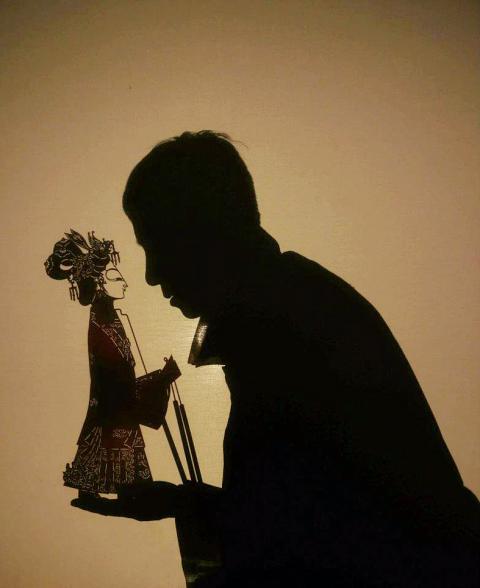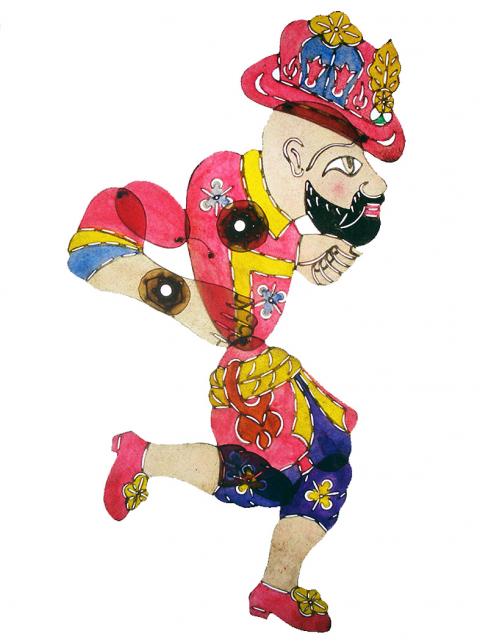With its top-notch selection of international and local productions, the Taiwan International Festival of the Arts (台灣國際藝術節) has become one of the most highly anticipated events of Taiwan’s arts calendar. Although still more than a month away, tickets for some shows have already sold out, so if you haven’t already, it is time to start looking through the program and making plans.
The festival opens with a local production: Shadows of Love by the Taiyuan Puppet Theatre Company (台原偶戲團). Taiyuan has spent the past decade pushing the boundaries of puppetry, and has produced a string of popular contemporary puppet shows. These shows have been notable for their diversity, for not only does Taiyuan strive to try new ways of using puppets on stage, it has also actively sought out international collaborations in the search for new material and ideas.
While routinely playing to packed houses in Taipei and with a proven track record on the international arts festival circuit, Taiyuan has remained part of the alternative scene in Taiwan. That it was chosen to open Taiwan’s most significant showcase of contemporary arts, an event that follows on from the company’s 10th anniversary last year, is a signal of recognition from the arts establishment.

Photo Courtesy of Taiyuan Puppet Theatre Company
“This is an affirmation of everything we have done,” Taiyuan director Wu Shan-shan (伍姍姍) told the Taipei Times in a phone interview earlier this week. “It is really great to be associated with this festival. We especially love that it is a Taiwanese festival, because we really have a bit of a love affair with the country, especially [artistic director] Robin [Ruizendaal].”
Taiyuan’s commitment to Taiwan and Taiwanese puppetry has not prevented it from forging links with artists working within other cultures and traditions.
Shadows of Love is an unprecedented three-way collaboration between Taiyuan, the Cengiz Ozek Shadow Theater of Istanbul and the Beijing Shadow Puppet Theater Company (北京皮影劇團). Although this is Taiyuan’s first extensive foray into shadow puppet theater, the use of shadows as an integral part of production design goes back many years, and owes a debt to the American theater artist and filmmaker Larry Reed. Wu said members of Taiyuan had studied with Reed, one of the few Westerners to be trained as a puppet master in the Indonesian wayang kulit tradition. His inspiration prompted the company to use lighting and multimedia to expand the genre’s creative horizons.

Photo Courtesy of Taiyuan Puppet Theatre Company
This new production has had extensive input from Turkish shadow puppet master Cengiz Ozek and from Lu Baogang (路寶剛), the fifth generation descendant of the founder of the Beijing Shadow Puppet Theater Company, which traces its roots back to 1842. Wu said that their participation was crucial in providing Shadows of Love with greater depth, and their immersion in their own respective traditions provided invaluable inspiration for the story.
Wu said that in addition to shadow puppets, this production also includes animation and film.
“It is another way of connecting past and present,” Wu said. “After all, shadow puppets, flickering images on a screen, were the first cinema.”

Photo Courtesy of Taiyuan Puppet Theatre Company
The use of animation, created by I Visual Design (愛視覺創意設計有限公司), a Taipei-based company, is a first for Taiyuan, and Wu was thrilled at the manner in which the animation echoes the effects created by the handheld puppets. “We want to keep the accent of the original [puppetry] art, and take it as an element in a contemporary theater production,” Wu said.
There will be six performances of Shadows of Love, from Feb. 16 to Feb. 19, at the National Experimental Theater, Taipei City. Two of these are already sold out and only a small number of tickets remain for the others.
Puppetry features strongly on the festival lineup this year, with La Reminiscence d’un Fantome by Taiwan’s The Puppet and Its Double Theater (無獨有偶工作室劇團), Hand Stories by Yeung Fai from Theatre Vidy-Lausanne of Switzerland, and The Adventures of Alvin Sputnik: Deep Sea Explorer by Tim Watts and the Perth Theatre Company.
As for the other festival shows, only a very few tickets remain for the highly anticipated Russian-language production of Shakespeare’s The Tempest by British director Declan Donnellan and Peter Brook’s production of The Magic Flute is already sold out.
Detailed information on the festival program and ticketing details, in English and Chinese, can be found at the festival’s Web site: tifa.ntch.edu.tw.

In the next few months tough decisions will need to be made by the Taiwan People’s Party (TPP) and their pan-blue allies in the Chinese Nationalist Party (KMT). It will reveal just how real their alliance is with actual power at stake. Party founder Ko Wen-je (柯文哲) faced these tough questions, which we explored in part one of this series, “Ko Wen-je, the KMT’s prickly ally,” (Aug. 16, page 12). Ko was open to cooperation, but on his terms. He openly fretted about being “swallowed up” by the KMT, and was keenly aware of the experience of the People’s First Party

Aug. 25 to Aug. 31 Although Mr. Lin (林) had been married to his Japanese wife for a decade, their union was never legally recognized — and even their daughter was officially deemed illegitimate. During the first half of Japanese rule in Taiwan, only marriages between Japanese men and Taiwanese women were valid, unless the Taiwanese husband formally joined a Japanese household. In 1920, Lin took his frustrations directly to the Ministry of Home Affairs: “Since Japan took possession of Taiwan, we have obeyed the government’s directives and committed ourselves to breaking old Qing-era customs. Yet ... our marriages remain unrecognized,

Not long into Mistress Dispeller, a quietly jaw-dropping new documentary from director Elizabeth Lo, the film’s eponymous character lays out her thesis for ridding marriages of troublesome extra lovers. “When someone becomes a mistress,” she says, “it’s because they feel they don’t deserve complete love. She’s the one who needs our help the most.” Wang Zhenxi, a mistress dispeller based in north-central China’s Henan province, is one of a growing number of self-styled professionals who earn a living by intervening in people’s marriages — to “dispel” them of intruders. “I was looking for a love story set in China,” says Lo,

During the Metal Ages, prior to the arrival of the Dutch and Chinese, a great shift took place in indigenous material culture. Glass and agate beads, introduced after 400BC, completely replaced Taiwanese nephrite (jade) as the ornamental materials of choice, anthropologist Liu Jiun-Yu (劉俊昱) of the University of Washington wrote in a 2023 article. He added of the island’s modern indigenous peoples: “They are the descendants of prehistoric Formosans but have no nephrite-using cultures.” Moderns squint at that dynamic era of trade and cultural change through the mutually supporting lenses of later settler-colonialism and imperial power, which treated the indigenous as